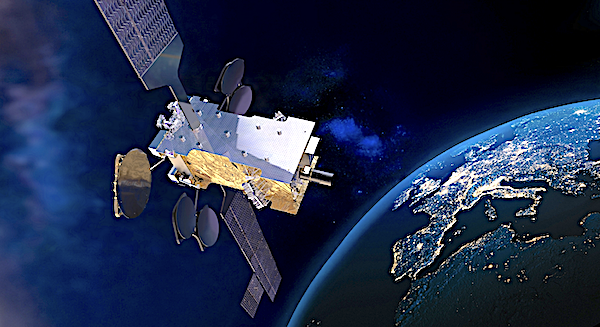
Thales Alenia Space, the joint venture between Thales (67 per cent) and Leonardo (33 per cent), and Hispasat, Redeia’s satellite services operator, have announced the start of the development, manufacturing, verification, and validation phase of the QKD-GEO prototype, Spain’s quantum key distribution system from geostationary orbit.
With a budget of €103.5 million, the QKD-GEO mission is a project initiated by the Spanish Secretary of State for Telecommunications and Digital Infrastructures and funded by European funds from the Recovery, Transformation, and Resilience Plan (PERTE Aeroespacial), for which contracting is managed by CDTI.
Lasting a total of 24 months, the QKD-GEO project comprises the development of the various components for a future quantum key distribution system from geostationary orbit. Specifically, it encompasses the development of a quantum payload to be hosted on a geostationary satellite, as well as the associated ground segment.
GEO-QKD has successfully completed the initial four-month system design phase, in which the system architecture has been established and the various elements of the system have been defined. The geostationary payload consists of a high-precision telescope with its pointing mechanism and integrated electronics, a quantum random number generator, a signal source of polarized photons, a laser beacon, and a processor for generating the keys and implementing the communications protocol. The ground segment consists of optical stations equipped with telescopes for receiving the photons transmitted from space and recovering the keys, as well as an operations center that organizes and controls all system activities, ensuring the smooth functioning of both the space segment and user interactions.
The project also includes a field test campaign with a 140-km atmospheric link between the islands of La Palma and Tenerife. These tests will enable functional validation of the ground segment and the quantum payload under fully representative conditions, prior to its implementation in an operational mission in orbit.
Thales Alenia Space is leading from Spain a large industrial consortium composed of Spanish and other European companies, including Thales Alenia Space in France and Switzerland, and with the participation of several entities specialized in the field of quantum communications, such as the Institute of Astrophysics of the Canary Islands (IAC), the Polytechnic University of Madrid and the University of Vigo. Meanwhile, Hispasat is responsible for the design of the geostationary mission and the definition of the business plan, with support from companies like Banco de Santander, BBVA, Telefónica, and Cellnex to analyze real use cases with the banking sector and terrestrial operators.
In June 2019, the European Commission announced its position in favor of the European Quantum Communications Infrastructure (EuroQCI), which will deploy the first quantum communications nodes in different EU countries in forthcoming years. These nodes, which will cover metropolitan areas, will be connected to each other by satellite to ensure their resilience. For that purpose, IRIS2, the secure satellite communications system promoted by the Commission, developed by a consortium with the participation of Hispasat and for which Hispasat and Thales Alenia Space contributed to the preliminary study, will include these EuroQCI satellite connections among its missions. The QKD-GEO project will allow Spain to configure its main contribution to these European initiatives in the space sector.
Ismael López, CEO of Thales Alenia Space in Spain, commented, “QKD-GEO mission represents a great technological challenge that will place Spanish industry at the forefront in quantum communications from geostationary orbit, a pioneering technology on a global level. We thank CDTI and our partner Hispasat for their faith in us to lead this ambitious project. At Thales Alenia Space, we firmly believe in a technology that is poised to revolutionize communication security in the coming years.”
Miguel Ángel Panduro, CEO of Hispasat, added that “the establishment of encryption keys through a quantum protocol is going to represent a paradigm shift in the secure communications of the future, where space and satellites will be configured as the ideal infrastructure for their transmission over long distances. Therefore, for Hispasat it is essential to position itself at an international level in this field and, together with other Spanish companies and entities, contribute to positioning our country as a leader in quantum technology.”

